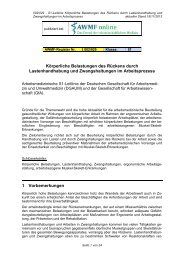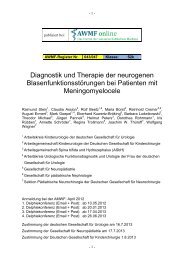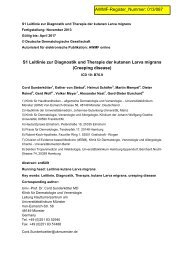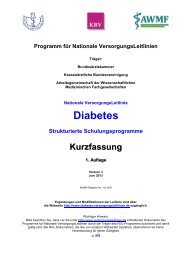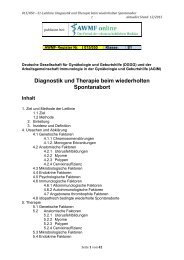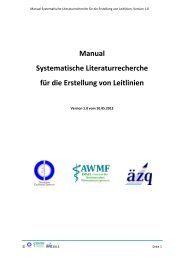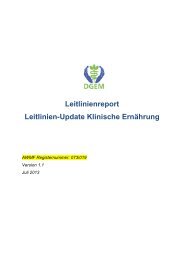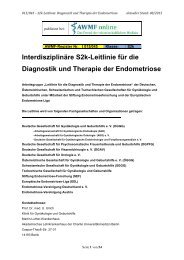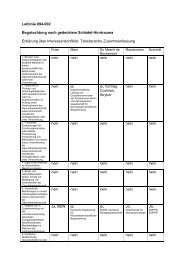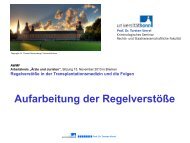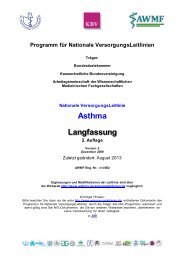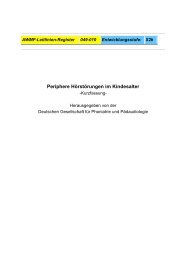S3-Leitlinie Demenzen (Kurzversion) - AWMF
S3-Leitlinie Demenzen (Kurzversion) - AWMF
S3-Leitlinie Demenzen (Kurzversion) - AWMF
Erfolgreiche ePaper selbst erstellen
Machen Sie aus Ihren PDF Publikationen ein blätterbares Flipbook mit unserer einzigartigen Google optimierten e-Paper Software.
58<br />
Literatur<br />
200. Eaton M, Mitchell-Bonair IL, Friedmann E: The effect of touch on nutritional intake of chronic organic brain<br />
syndrome patients. J Gerontol 1986; 41: 611-616.<br />
201. Forbes D, Morgan DG, Bangma J, et al.: Light therapy for managing sleep, behaviour, and mood disturbances<br />
in dementia. Cochrane Database Syst Rev 2004 (2): CD003946.<br />
202. Skjerve A, Bjorvatn B, Holsten F: Light therapy for behavioural and psychological symptoms of dementia.<br />
Int J Geriatr Psychiatry 2004; 19: 516-522.<br />
203. Livingston G, Johnston K, Katona C, et al.: Systematic review of psychological approaches to the<br />
management of neuropsychiatric symptoms of dementia. Am J Psychiatry 2005; 162: 1996-2021.<br />
204. Ayalon L, Gum AM, Feliciano L, et al.: Effectiveness of nonpharmacological interventions for the<br />
management of neuropsychiatric symptoms in patients with dementia: a systematic review. Arch Intern Med<br />
2006; 166: 2182-2188.<br />
205. Fossey J, Ballard C, Juszczak E, et al.: Effect of enhanced psychosocial care on antipsychotic use in nursing<br />
home residents with severe dementia: cluster randomised trial. BMJ 2006; 332: 756-761.<br />
206. Bartholomeyczik S, Halek M, Sowinski C, et al.: Rahmenempfehlungen zum Umgang mit herausforderndem<br />
Verhalten bei Menschen mit Demenz in der stationären Altenhilfe. Berlin, Bundesministerium für Gesundheit<br />
2007.<br />
207. Snowden M, Sato K, Roy-Byrne P: Assessment and treatment of nursing home residents with depression or<br />
behavioral symptoms associated with dementia: a review of the literature. J Am Geriatr Soc 2003; 51: 1305-<br />
1317.<br />
208. Teri L, McKenzie G, LaFazia D: Psychosocial treatment of depression in older adults with dementia. Clin<br />
Psychol - Sci Pr 2005; 12: 303-316.<br />
209. Teri L, Logsdon RG, Uomoto J, McCurry SM: Behavioral treatment of depression in dementia patients: a<br />
controlled clinical trial. J Gerontol B Psychol Sci Soc Sci 1997; 52: P159-166.<br />
210. Williams CL, Tappen RM: Exercise training for depressed older adults with Alzheimer's disease. Aging Ment<br />
Health 2008; 12: 72-80.<br />
211. Gillette Guyonnet S, Abellan Van Kan G, Alix E, et al.: IANA (International Academy on Nutrition and<br />
Aging) Expert Group: weight loss and Alzheimer's disease. J Nutr Health Aging 2007; 11: 38-48.<br />
212. Riviere S, Gillette-Guyonnet S, Voisin T, et al.: A nutritional education program could prevent weight loss<br />
and slow cognitive decline in Alzheimer's disease. J Nutr Health Aging 2001; 5: 295-299.<br />
213. Watson R, Green SM: Feeding and dementia: a systematic literature review. J Adv Nurs 2006; 54: 86-93.<br />
214. Nijs KA, de Graaf C, Kok FJ, et al.: Effect of family style mealtimes on quality of life, physical performance,<br />
and body weight of nursing home residents: cluster randomised controlled trial. BMJ 2006; 332: 1180-1184.<br />
215. Dunne TE, Neargarder SA, Cipolloni PB, et al.: Visual contrast enhances food and liquid intake in advanced<br />
Alzheimer's disease. Clin Nutr 2004; 23: 533-538.<br />
216. Baumgarten M, Hanley JA, Infante-Rivard C, et al.: Health of family members caring for elderly persons<br />
with dementia. A longitudinal study. Ann Intern Med 1994; 120: 126-132.<br />
217. Bruce DG, Paley GA, Nichols P, et al.: Physical disability contributes to caregiver stress in dementia<br />
caregivers. J Gerontol A Biol Sci Med Sci 2005; 60: 345-349.<br />
218. Scholzel-Dorenbos CJ, Draskovic I, Vernooij-Dassen MJ, et al.: Quality of life and burden of spouses of<br />
Alzheimer disease patients. Alzheimer Dis Assoc Disord 2009; 23: 171-177.<br />
219. Selwood A, Johnston K, Katona C, et al.: Systematic review of the effect of psychological interventions on<br />
family caregivers of people with dementia. J Affect Disord 2007; 101: 75-89.<br />
220. Gallagher-Thompson D, Coon DW: Evidence-based psychological treatments for distress in family<br />
caregivers of older adults. Psychol Aging 2007; 22: 37-51.<br />
221. Thompson CA, Spilsbury K, Hall J, et al.: Systematic review of information and support interventions for<br />
caregivers of people with dementia. BMC Geriatr 2007; 7: 18.<br />
222. Brodaty H, Green A, Koschera A: Meta-analysis of psychosocial interventions for caregivers of people with<br />
dementia. J Am Geriatr Soc 2003; 51: 657-664.<br />
223. Sorensen S, Pinquart M, Duberstein P: How effective are interventions with caregivers? An updated metaanalysis.<br />
Gerontologist 2002; 42: 356-372.<br />
224. Chang BL: Cognitive-behavioral intervention for homebound caregivers of persons with dementia. Nurs Res<br />
1999; 48: 173-182.<br />
225. Heyn PC, Johnson KE, Kramer AF: Endurance and strength training outcomes on cognitively impaired and<br />
cognitively intact older adults: a meta-analysis. J Nutr Health Aging 2008; 12: 401-409.<br />
<strong>S3</strong>-<strong>Leitlinie</strong> "<strong>Demenzen</strong>": <strong>Kurzversion</strong> (November 2009)<br />
Die "<strong>Leitlinie</strong>n" der Wissenschaftlichen Medizinischen Fachgesellschaften sind systematisch entwickelte<br />
Hilfen für Ärzte zur Entscheidungsfindung in spezifischen Situationen. Sie beruhen auf aktuellen wissenschaftlichen<br />
Erkenntnissen und in der Praxis bewährten Verfahren und sorgen für mehr Sicherheit in der Medizin, sollten aber auch<br />
ökonomische Aspekte berücksichtigen. Die "<strong>Leitlinie</strong>n" sind für Ärzte rechtlich nicht bindend und haben daher weder<br />
haftungsbegründende noch haftungsbefreiende Wirkung.<br />
Die <strong>AWMF</strong> erfasst und publiziert die <strong>Leitlinie</strong>n der Fachgesellschaften mit größtmöglicher Sorgfalt - dennoch kann die<br />
<strong>AWMF</strong> für die Richtigkeit - insbesondere von Dosierungsangaben - keine Verantwortung übernehmen.



